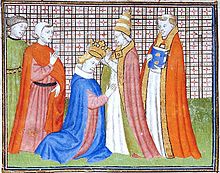Nicholas V (antipope)

Nicholas V , actually Pietro Rainalducci (* around 1275 in Corvaro , Italy ; † October 16, 1333 in Avignon ) was an antipope to John XXII from 1328 to 1330 . He should not be confused with Nicholas V (Tommaso Parentucelli) of the same name , who was counted as a regular Pope and who was in office from 1447 to 1455.
Life
The Franciscan Pietro Rainalducci came from a humble background. After five years of marriage to Giovanna Mattei, he separated from his wife and entered the Franciscan monastery of Santa Maria in Rome . There he is said to have enjoyed a dubious reputation. His asceticism , marked as saintly , was in contrast to an allegedly rebellious disposition. In any case, on the issue of poverty he was close to the view of the spiritual .
During his entire reign, Louis the Bavarian found himself in a serious political conflict with the Avignon papacy and accused the ruling popes of heresy . In his fight against John XXII. he was supported by the Franciscan Order, which was persecuted by the Pope because of the poverty dispute . In order to be crowned emperor on his Italian march in Rome , Ludwig urged the appointment of an antipope and had the Franciscan Pietro Rainalducci elected pope on May 12, 1328 by a committee of 13 Roman clerics and confirmed by the people by acclamation . Rainalducci took as Pope the by Nicholas III. (a Franciscan-friendly Orsini Pope) and Nicholas IV (the first Franciscan Pope) established the “Franciscan” Pope name Nicholas and called himself “Nicholas V.” Immediately after his election, he was crowned emperor on May 15, 1328 and appointed in his first Consistory six of the nine cardinals he raised . He then tried to set up his own Roman curia . He appointed about 20 bishops from the ranks of the anti-papal Franciscans and Augustinians .
Nikolaus (V), who was characterized as politically distant, never achieved greater importance. After Ludwig's departure from Rome, he lost more and more followers in Italy. The Emperor's intention to weaken the Pope in Avignon by electing an antipope had failed. When Nikolaus distanced himself from Emperor Ludwig, his situation worsened.
After Pope John XXII. had offered the pardon and a pension of 3000 gold florins , Nicholas resigned his office on July 25, 1330 in Pisa and submitted to the Pope on August 25, 1330 in Avignon . He spent the rest of his life in Avignon, where he lived under house arrest in the Papal Palace but was treated with honor. He was buried in the Franciscan Church in Avignon . Nicholas (V) is probably the only medieval pope who was married.
literature
- Helmut Feld : Franciscans. Eugen Ulmer, Stuttgart 2008, ISBN 978-3-8001-2889-1 , p. 94.
- Ansgar Frenken: Nicholas V. Antipope. In: Biographisch-Bibliographisches Kirchenlexikon (BBKL). Volume 6, Bautz, Herzberg 1993, ISBN 3-88309-044-1 , Sp. 871-872.
- Amedeo De Vincentiis: Niccolò V, antipapa. In: Massimo Bray (ed.): Enciclopedia dei Papi. Volume 2: Niccolò I, santo, Sisto IV. Istituto della Enciclopedia Italiana, Rome 2000, pp. 522-524 ( treccani.it ) ..
- Amedeo De Vincentiis: NICCOLÒ V, antipapa. In: Raffaele Romanelli (ed.): Dizionario Biografico degli Italiani (DBI). Volume 78: Natta – Nurra. Istituto della Enciclopedia Italiana, Rome 2013.
- Georg Kreuzer: Nicholas V, antipope (1328-1330) . In: Lexicon of the Middle Ages (LexMA). Volume 6, Artemis & Winkler, Munich / Zurich 1993, ISBN 3-7608-8906-9 , Sp. 1172 f.
- Nicholas (V.) . In: Meyers Großes Konversations-Lexikon . 6th edition. Volume 14, Bibliographisches Institut, Leipzig / Vienna 1908, pp. 694–695 . - (p. 695)
| personal data | |
|---|---|
| SURNAME | Nicholas V. |
| ALTERNATIVE NAMES | Pietro Rainalducci |
| BRIEF DESCRIPTION | Antipope of Pope John XXII. (1328-1330) |
| DATE OF BIRTH | around 1275 |
| PLACE OF BIRTH | Corvaro , Italy |
| DATE OF DEATH | October 16, 1333 |
| Place of death | Avignon |